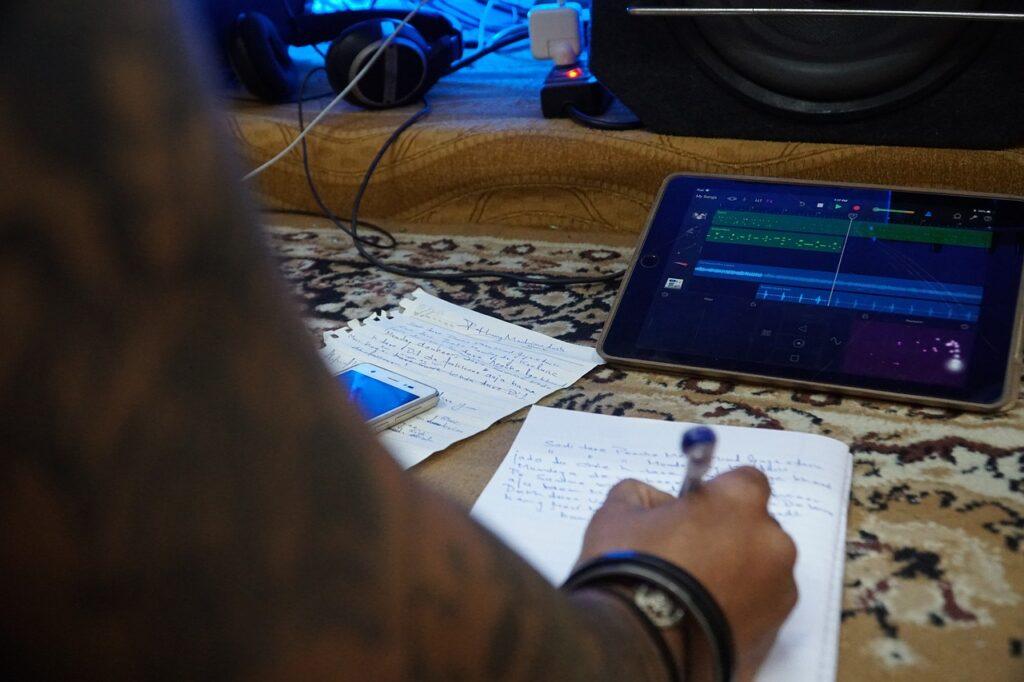Estimated reading time 3 minutes
Table of Contents
Introduction to "Where Do I Get Inspiration for My Lyrics?"
Have you ever stared at a blank page, trying to come up with a lyric idea? Do you ever ask, “Where do I get inspiration for my lyrics?” Look no further! I’ll give you three lyric writing starter ideas to help you get the juices flowing. Read more to learn how to get back on track with your writing.
Today’s lyric writing tips come from a songwriting workshop I did years ago. Martha Rogers, editor for the Boston Songwriters Workshop (BSW) Newsletter, writes, “Witty, corny, tender, commanding – these words begin to describe the kinds of plot lines, hooks, and rhymes people brainstormed during the BSW Collaboration Workshop…” (BSW Newsletter January 2000, 1). The next section discusses what we did at the Collaboration Workshop.
This post uses some technical words. See the definitions in the Glossary below.

"Where Do I Get Inspiration for My Lyrics?" and the BSW Collaboration Workshop
First, we broke up into groups of four or five people. I gave each group six pictures to look at. Their task: use one of the pictures to inspire a plot line.
Rogers comments, “The tales of woe, compassion, competition, and longing ranged from:
- “…the streets of urban poverty…”
- “…[a] beaver’s environmental home in the suburbs…”
- “…two women’s drama in a bar…”
- “…a fundraiser finding gold in a wedding band…”
As you can see, they invented several unique and interesting scenarios. Where do you get inspiration for your lyrics? Try this one:
The second task: Come up with song lyric hooks using place names from a city, nation, or continent. It didn’t even have to be a real place. It could be fictional, mythical, or interstellar.
Rodgers says, “People ‘went to town’ on this one:
- “Divine Providence”
- “I’m in a Napa Valley Daze”
- “Betcha Can in Ketchikan”
“Try it and see where it takes you!” (BSW Newsletter January 2000, 1).
The collaborators used their rhyming dictionaries for the third task. I gave them the line, “On a balmy, moonlit shoreline…” Then, they had to come up with a rhyme to complete the line.
Rodger writes, “In sharing, we clarified our understanding of the different kinds of rhymes and discussed the rhythmic accents from the original line” (BSW Newsletter January 2000, 1).
So, where do you get inspiration for your lyrics? Make a challenge for yourself like the ones above that I created for the Collaboration Workshop. Then, it’s just a matter of brainstorming.

Concluding Thoughts to “Where Do I Get Inspiration for My Lyrics?”
In addition to the kickstarter ideas, collaborating with another songwriter can be a good way to get inspiration for your lyrics. Rogers comments, “We all agreed that in collaboration we came up with material quite different from any one of us alone.” (BSW Newsletter January 2000, 1).
I’ll leave you with a quote from Pete Luboff, “The most important thing to keep in mind while writing alone or collaborating is that you’re writing because you love it and the purpose is to have a good time” (qtd. in The Craft and Business of Songwriting).
© 2022 Geoffrey Keith
Join me for online or in-person lessons today!
Glossary
Singing Intervals
Do you want to learn to sing? Do you need help with hearing and singing intervals? Being able to hear musical intervals is a valuable skill. You can use it for identifying intervals, which is an essential skill in vocal sight reading. Also, it’s important for singing melodies in tune. Read more to learn about singing intervals. Estimated reading time 2 minutes.
Read MoreDiscover Which Notes Are Authentic Blue Notes
“Which notes are authentic blue notes?” The following post clears up the confusion around blue notes and has an example of a popular song that uses them. Keep reading to learn how it works. Estimated reading time 3 minutes.
Read MoreWhat Does Prodigy Mean and Do They Have Elite Musical Talent?
Do you have a musical prodigy on your hands? Do you need information about how your musical child or student learns? Musical giftedness can emerge as early as one to two years old and usually appears before age six. It’s characterized by a rage to learn. Keep reading “What Does Prodigy Mean and Do They Have Elite Musical Talent?” to get examples of this shocking musical ability. Estimated reading time 5 minutes.
Read MoreWhat’s the Difference Between Just Intonation and Equal Temperament?
What’s the difference between just intonation and equal temperament? They differ in terms of how they sound, the number of notes, and their user friendliness. Click to learn about the advantages and disadvantages of each. Estimated reading time 3 minutes.
Read More



![Prodigy Meaning (Examples of Special Talent in Music) [Video] - Children Playing Music - Sing the Charming Song London Bridge Is Falling Down](https://successmusicstudio.com/wp-content/uploads/2024/05/Prodigy-Meaning-Examples-of-Special-Talent-in-Music-Video-Children-Playing-Music-300x200.jpg)
